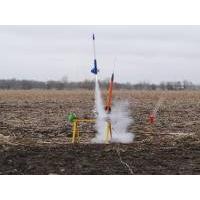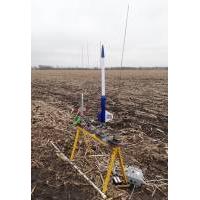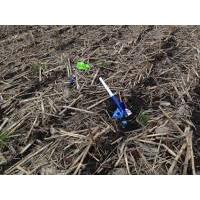Scratch Nova SS Original Design / Scratch Built
Scratch - Nova SS {Scratch}
Contributed by Bill Eichelberger
| Construction Rating: | starstarstarstarstar |
| Flight Rating: | starstarstarstar_borderstar_border |
| Overall Rating: | starstarstarstarstar_border |
| Published: | 2012-04-12 |
| Manufacturer: | Scratch |
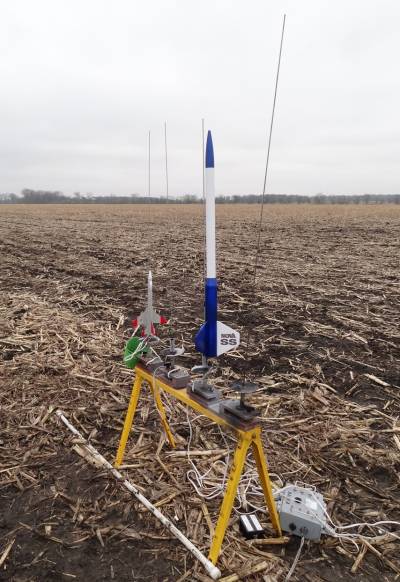 Brief
Brief
This project, like a lot of good ones before it, happened by accident. I'd bought two TA-6070 transitions from Semroc with the idea of restoring my badly flightworn upscale of the Centuri Taurus, but as it had turned out, I was able to use the transitions from the original project. This left me with two beautiful balsa transitions without a home, and one night as I was looking through the plans at YORF, I realized that two of my favorite FSI kits, the Nova and Sprint, could be built as upscales with the transitions as a starting point. Three days later I had the other parts I needed in hand.
Components
- PNC-60AH nose cone (Estes)
- 13.25" BT-70 (Semroc)
- 19.75" BT-60 (BMS)
- TA-6070 transition (Semroc - self drilled)
- 1/8" balsa fin stock (Hobby Lobby)
- 2 CR-5070 centering rings (Semroc)
- E engine hook (Semroc)
- BT-50 engine tube (shop scrap)
- CR-2050 engine block
- 36" length 150# Kevlar
- 36" length 1/4" sewing elastic
- medium snap swivel
Construction
The original Nova was a fairly straightforward build, and the upscale was no different. Since the TA-6070 transition isn't hollow, I decided to use a large drill bit and my Dremel tool to do the job. I drilled straight down through the balsa with the drill bit, then used one of the Dremel attachments to make it large enough for a BT50 to fit through. I tied the Kevlar around the motor tube, cut a slit in the forward centering ring and passed the Kevlar through, securing all with a generous helping of Elmer's glue. The Kevlar passes through the hole in the transition, so the sewing elastic that attached to it is a good three feet away from the source of the blast at ejection.
Finishing
After the filling and sanding, I puzzled over how to finish this bird for a long time, and it was almost two months after the first flight before I actually decided on a paint scheme. In the end, inspiration struck in the paint aisle of a local Hobby Lobby. I'd already found a Nova SS logo online that I thought would serve as a good decal for the fin, but I was having trouble picking colors. While looking for suitable paints for a camo scheme I had planned for an FSI Hercules I was building, I noticed a dark metal flake blue that was a close match to the color of the 1970 Nova that my buddy Cone had when we were terrorizing Greater Cincinnati in the years following high school. The paint is Testors One Coat Lacquer De Ja Blue. Since the rocket had already been sprayed Valspar gloss white, I just masked off one fin and the upper body tube, then sprayed the rest of the rocket with the De Ja Blue. I printed two of the logos on Bel Decal inkjet paper, although I've got ideas of finding a spot for a Cherry Bomb Muffler logo for old time's sake.
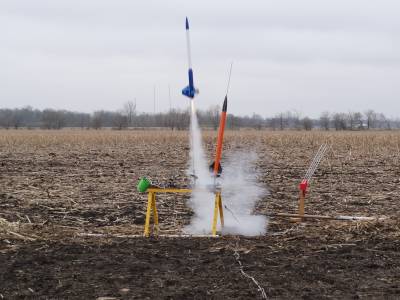
Flight
The first flight for the Nova SS happened on a sunny Saturday at a TORC launch in a cornfield in South Charleston, Ohio. I had spent the previous night finishing up the construction odds and ends on several rockets that I wanted to take with me the next day. The Nova just needed final assembly and paint, but I lost a battle with sleep before I could even get the bird primered. The next day at the launch it was my fourth and final flight, and while I was taking the on pad glamour shots, it never occurred to me that I was about to fly a cornhusk-colored rocket on a field of cornhusks. (In fact, it never occurred to me until about halfway through my unsuccessful search.)
The Nova ripped nicely off the pad on the Estes E9-4, burning long to a more than respectable height. Unfortunately the E9-4 ejection charge fired WAY early, more like an E9-1. The whole flightline cringed at what was sure to be a zipper. The parachute caught quickly and the rocket began a long, fast journey across the field to the spot where all of my rockets had landed all day. I started out after it and passed a guy waving and holding up a cornhusk-colored rocket with big fins. I waved and kept up my search, completely oblivious to the fact that another TORCer had picked my rocket up on the way back from recovering his own rocket. As I walked, I found my missing Viking 2 upscale, the rocket I'd started the day with and thought I'd lost forever. 45 minutes later I dejectedly gave up the search. On the way back in I found a rocket that I'd helped look for earlier, and I hoped that meant that the rocket Karma would mean that someone would find my Nova after I left and return it to me later.
Flight #2 came after paint and decals at another TORC launch. While I was prepping the Nova for flight, it occurred to me that I had yet to fly either of the keychain cameras that I had charged the previous night. I decided to fly them both on the Nova, one pointing up, one pointing down. Since the previous E9-4 flight had been less than spectacular, I decided to go with an E9-6 for this flight. I armed both cameras, slid the rocket onto the launch rod, and checked that both cameras were functioning. Something good was going to come out of this flight.
The flight profile for this flight was the same as all of the other E-flights I'd made on the day, a big bend to the left off the pad, then a recovery just out from the flightline. The only difference was that this rocket was nose down and accelerating when the ejection charge fired. When I got to the landing area I found one of the cameras still attached to the fin, and the other torn free and buried in the mud. It was when I picked the rocket up to take the camera off that I realized that the late ejection had caused the nose cone to rebound back into one of the fins. The leading edge of the fin was shattered, the fin was split, and the fillet broken. There was a clearly defined dent on the nose cone that told the story, and it will take a pretty decent amount of work before it's ready to fly again.
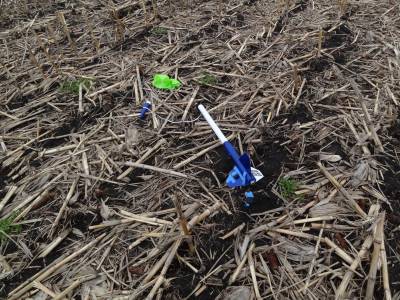
Summary
Pro's: Classic looks. Great going up on E motors.
Con's: Has had issues coming down on the E motors.
 |
 |
